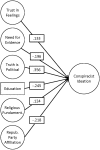Epistemic beliefs' role in promoting misperceptions and conspiracist ideation
- PMID: 28922387
- PMCID: PMC5603156
- DOI: 10.1371/journal.pone.0184733
Epistemic beliefs' role in promoting misperceptions and conspiracist ideation
Abstract
Widespread misperceptions undermine citizens' decision-making ability. Conclusions based on falsehoods and conspiracy theories are by definition flawed. This article demonstrates that individuals' epistemic beliefs-beliefs about the nature of knowledge and how one comes to know-have important implications for perception accuracy. The present study uses a series of large, nationally representative surveys of the U.S. population to produce valid and reliable measures of three aspects of epistemic beliefs: reliance on intuition for factual beliefs (Faith in Intuition for facts), importance of consistency between empirical evidence and beliefs (Need for evidence), and conviction that "facts" are politically constructed (Truth is political). Analyses confirm that these factors complement established predictors of misperception, substantively increasing our ability to explain both individuals' propensity to engage in conspiracist ideation, and their willingness to embrace falsehoods about high-profile scientific and political issues. Individuals who view reality as a political construct are significantly more likely to embrace falsehoods, whereas those who believe that their conclusions must hew to available evidence tend to hold more accurate beliefs. Confidence in the ability to intuitively recognize truth is a uniquely important predictor of conspiracist ideation. Results suggest that efforts to counter misperceptions may be helped by promoting epistemic beliefs emphasizing the importance of evidence, cautious use of feelings, and trust that rigorous assessment by knowledgeable specialists is an effective guard against political manipulation.
Conflict of interest statement
Figures


References
-
- Kuklinski JH, Quirk PJ, Jerit J, Schwieder D, Rich RF. Misinformation and the Currency of Democratic Citizenship. The Journal of Politics. 2000;62(03):790–816. 10.1111/0022-3816.00033 - DOI
-
- Jamieson KH. Implications of the Demise of “Fact” in Political Discourse. Proceedings of the American Philosophical Society. 2015;159(1):66–84.
-
- World Public Opinion. Percentage of Americans Believing Iraq had WMD Rises; 2006. Available from: http://worldpublicopinion.net/percentage-of-americans-believing-iraq-had....
-
- Pasek J, Stark TH, Krosnick JA, Tompson T. What motivates a conspiracy theory? Birther beliefs, partisanship, liberal-conservative ideology, and anti-Black attitudes. Electoral Studies. 2015;40:482–489. 10.1016/j.electstud.2014.09.009 - DOI
MeSH terms
LinkOut - more resources
Full Text Sources
Other Literature Sources

